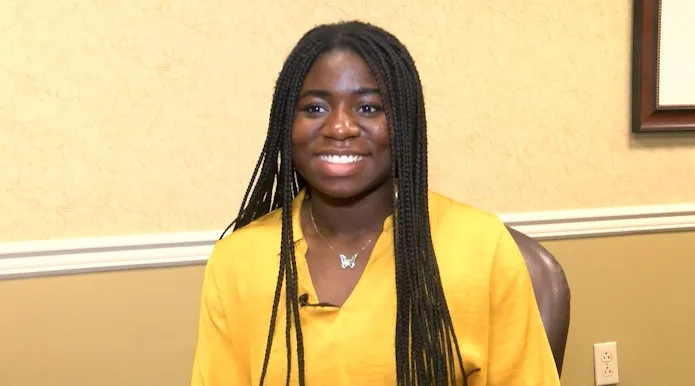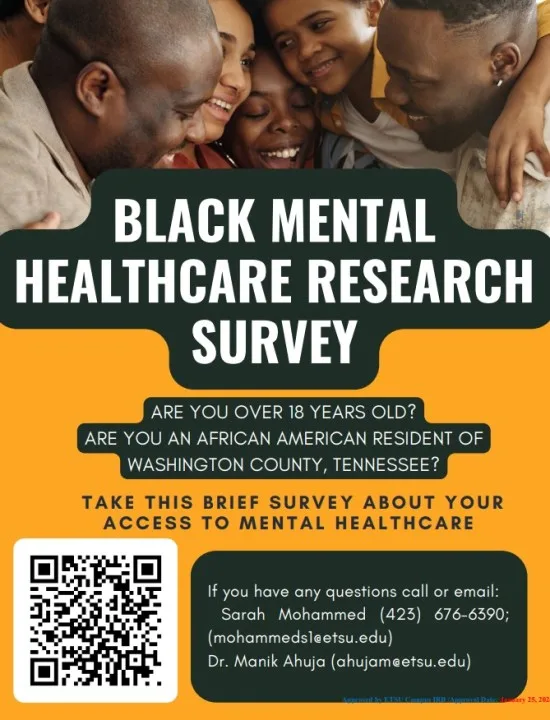JOHNSON CITY, Tenn. (WJHL) – Sarah Mohammed, East Tennessee State University sophomore majoring in psychology, won the ETSU Elevates pitch competition, winning a total of $6,000 to conduct a study on Black mental health care access in Washington County, Tennessee.
ETSU Elevates is a program that lets students choose an economic, social or environmental topic and lets them come up with a service-focused plan to implement their idea.
The students have to pitch their ideas to a panel of judges.

Mohammed’s issue of Black mental health care access won first place with a prize of $5,000, and she also won the people’s choice with $1,000 more to go towards the research.
“After facing some interesting times with my own mental health during high school, mental health became something that I was really, really passionate about,” Mohammed said. “And I just became very curious. Right. How does the black community in Washington County feel about their mental health? And are they getting the care that they need to address it, if it’s poor?”
Mohammed partnered with the Northeast Tennessee Association of Black Social Workers (NABSW) to help with the study.
Cory Whitfield, former president and current member of the group, said this study helps normalize the conversation of mental health within the Black community.
“I think one of the things that’s often kind of been told to us and I often heard when I was little was, we in the African-American community, we are a strong and we are a resilient group,” Whitfield said. “And as long as we have church and God and family that we can overcome. And these things are true, but being resilient and being strong and all of these things does not also mean that that those things don’t come with trouble. And it should be okay for us to be able to say, in spite of the fact that all of these things are surrounding me and my community, I don’t feel okay today.”
Mohammed said they plan to do outreach into the rural parts of Washington County as well.
“Such as Fall Branch, right,” Mohammed, said. “And that’s where the data I think will really speak is not just for Johnson City, but for those who may have less access to resources than those who live in the city.”
“From statistics from the National Institute of Mental Health, we see disparities between utilization and mental health care, between race especially. And that reflects here even in Appalachia. Right. I think Appalachia can be a picture of what’s happening in the rest of the country as well. So not having access to those things that shape your mental well-being is life-changing. Right? Life changing for the worse. So if we can intervene in those disparities and find out why, then it just creates a better quality of life for the people in the region.”
The data from the study will be shared with healthcare providers in the area.
“So that patients who come in looking for mental health who are African-American can receive the best care possible so that providers understand what these patients are going through, and the concerns that they might have so that they can address that with dignity and care.”
Whitfield also believes the study will be beneficial for providers and those seeking care.
“It will let clinicians and practitioners in our environment and in our community know that we need to be a little bit more culturally competent with how we address the African-American community when it comes to mental health, because that will make them feel a little bit more comfortable with seeking those services,” Whitfield said.
The Northeast Tennessee Chapter of NABSW will also help Mohammed get connected to community stakeholders and partners.

“This is monumental, groundbreaking work that Sarah is doing,” Whitfield said. “And so I really do hope that everyone takes advantage of this opportunity. Data tells the story.”
“We can come out and we can do all of these stories and we can do these testimonies, but it is so very important that if we want to make systematic change that we have the numbers and the data to back up what we’re trying to do.”
Mohammed plans to keep the study open from February to early April. It is a paid study open to African Americans in Washington County over the age of 18.


